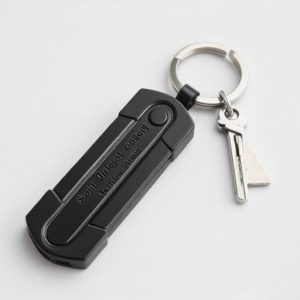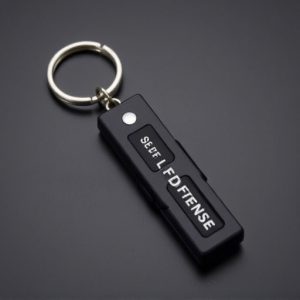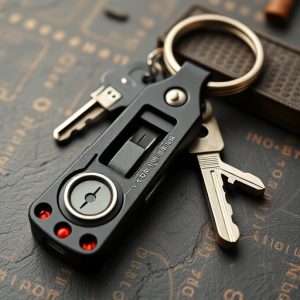Navigating Defensive Keychains: Laws, Decibels, & Safe Carry Practices
Personal alarm keychains are legal self-defense tools in many US states (check local laws), emitting…….
Personal alarm keychains are legal self-defense tools in many US states (check local laws), emitting 120-140 dB sounds to startle attackers. They can be carried openly or concealed, but state rules vary regarding storage when not in use. Always verify your state's regulations, ensuring decibel levels meet the required safety standards for legal protection and personal safety.
“Uncover the power of self-defense with our guide to defensive keychains and state legal carry guidelines. Explore the intricate web of regulations surrounding personal alarm keychains, understanding decibel limits and usage restrictions. Learn who can legally carry, where, and how these compact devices can enhance safety.
Dive into best practices, dispel common myths, and find answers to frequently asked questions. Empower yourself with knowledge on ‘loud enough’ decibels and navigate the legal landscape to ensure responsible and effective use of defensive keychains.”
- Understanding State Laws on Personal Alarm Keychains
- Legal Carry Guidelines: Who and Where Can You Use It?
- Decibel Levels: What's Considered Loud Enough?
- Defensive Keychain Best Practices for Safety
- Common Misconceptions and FAQs About Legal Carry
Understanding State Laws on Personal Alarm Keychains
In many states, personal alarm keychains are legal and considered a valid self-defense tool. These compact devices, often attached to a keychain or lanyard, emit a powerful sound typically ranging from 120 to 140 decibels, making them loud enough to startle and deter potential assailants. The legality of personal alarm keychains varies by state, with some allowing their open carry while others restrict their use to private property only.
Understanding these state laws is crucial before purchasing or carrying a personal alarm keychain. Some states have specific guidelines regarding the type of alarm allowed, its size, and the circumstances under which it can be carried openly or concealed. For instance, certain states permit these devices for self-defense but mandate that they must be kept in a locked glove compartment or similar secure area when not in use. Others might allow open carry without restrictions. It’s essential to check your state’s specific regulations to ensure compliance and full legal protection.
Legal Carry Guidelines: Who and Where Can You Use It?
The legality of carrying a personal alarm keychain varies across states, so it’s crucial to understand the specific guidelines in your area. In many places, these compact and discreet devices are permitted for self-defense purposes as long as they meet certain criteria. Typically, this includes a requirement for a certain decibel level, typically around 120 decibels or higher, ensuring the alarm is loud enough to deter potential attackers.
The keychains can be carried by anyone over the age of 18 (or a specified age limit in some states) and are often allowed in public spaces like restaurants, parks, and shopping centers, as well as in your vehicle. Some states also permit their use in specific situations, such as when walking alone at night or during outdoor activities. Always check local legislation to ensure compliance and peace of mind.
Decibel Levels: What's Considered Loud Enough?
When considering a personal alarm keychain for legal carry, understanding decibel levels is crucial. What constitutes a loud enough sound varies, but generally, devices should produce at least 120 decibels (dB) to effectively deter potential threats. This threshold ensures that the alarm’s volume is sufficient to startle and alert those nearby without causing harm or permanent damage to hearing.
Decibel levels above 85 dB can cause hearing damage over extended exposure, so it’s important to choose a keychain alarm that operates within safe parameters. Personal alarm keychains designed for legal carry often include features like adjustable volume settings, allowing users to choose the appropriate decibel level based on their specific situation and local noise ordinances.
Defensive Keychain Best Practices for Safety
When it comes to personal safety, a defensive keychain equipped with a loud personal alarm can be a powerful tool. Best practices suggest keeping it easily accessible and within reach at all times. This means attaching it to your keyring or bag, ensuring it’s not buried in a pocket or purse where it might not be quickly retrievable in an emergency. Regularly test the alarm functionality to ensure it’s working optimally, as a reliable device can be the difference between safety and danger.
Additionally, familiarize yourself with local laws regarding self-defense tools like keychains with alarms. Understand the legal decibel limits and ranges for personal alarms to use them effectively without facing legal repercussions. Responsible usage includes activating the alarm only when genuinely threatened or as a last resort, which helps maintain its effectiveness in critical situations.
Common Misconceptions and FAQs About Legal Carry
Many individuals carrying a personal alarm keychain for self-defense have misconceptions about what’s legal and what isn’t in their state. It’s important to clear the air on some common FAQs. One widely held belief is that any device making over 120 decibels is always legal. However, while high-decibel alarms can deter attackers, they may not be permitted in certain locations or carry specific restrictions.
Another misconception is that personal alarms are universally allowed in public spaces. The legality of carrying a loud keychain alarm varies widely from state to state and even within different municipalities. Some areas have strict rules about the type, size, and decibel level of personal protection devices, while others may not regulate them at all. Always check your local laws to ensure you’re carrying a legal personal alarm, such as those with loud decibels, for peace of mind.
Carrying a personal alarm keychain can be a powerful tool for self-defense, but understanding state laws and legal carry guidelines is essential. When used responsibly and within decibel limits, these devices can provide peace of mind in various situations. By adhering to best practices and dispelling common misconceptions, you can ensure the safe and legal use of your personal alarm keychain, empowering yourself while respecting the law.


